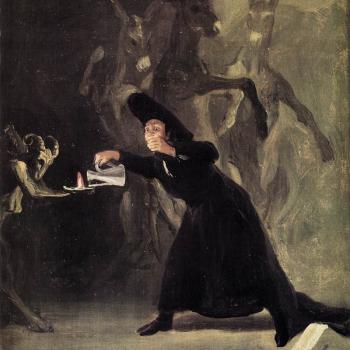But then there is Augustine. As in many things, his writings on schism impress. What comes across more than anything is his spirit of charity, his earnest desire for the renewal of communion. There are threats, yes. But, more often than that, there are avowals of mutual love and respect, of a desire to see error left behind. Whatever he wrote against the Donatists, he never denied the validity of their baptism (a point still controversial among some Orthodox). Augustine, in the midst of a terrible schism, in which he was attacked for his views on Donatism, writes in favor of the validity of their baptism:
To this we answer that the baptism of the Church exists even among heretics, though they themselves are not within the Church; just as the water of Paradise was found in the land of Egypt, though that land was not itself in Paradise. We do not therefore admit heretics to communion without baptism; and since they come with their waywardness corrected, we receive not their sins, but the sacraments of Christ. (De unico baptismo contra Petilianum, VII, IV)
And this from a man so often thought dour, so often thought uncompromising—the supposed forerunner of Calvinism!
I am sure that some will see my words here as an excuse to bury my head in the sand like an ostrich. Perhaps that is the case. But when one sees schism enveloping the world, when one has time and cause to reflect on one’s mortality, on the finitude of this earthly existence, when one looks into history and sees the myriad people who have decided to die upon this or that hill, one tends to reconsider the significance of such squabbles in one’s one life. The poor will always be with us; they remain here to be served. The temptation of schism also remains always. The drama of salvation unfolds in each soul. Augustine, of course, reminds us of just that:
What then have I to do with men, that they should hear my confessions, as if they were going to cure all my diseases? A people curious to know the lives of others, but slow to correct their own. Why do they desire to hear from me what I am, who are unwilling to hear from You what they are? And how can they tell, when they hear from me of myself, whether I speak the truth, seeing that no man knows what is in man, save the spirit of man which is in him? (1 Corinthians 2:11) But if they hear from You anything concerning themselves, they will not be able to say, The Lord lies. For what is it to hear from You of themselves, but to know themselves? And who is he that knows himself and says, It is false, unless he himself lies? But because charity believes all things (1 Corinthians 13:7) (among those at all events whom by union with itself it makes one), I too, O Lord, also so confess unto You that men may hear, to whom I cannot prove whether I confess the truth, yet do they believe me whose ears charity opens unto me. (Confessiones, X, III)

















